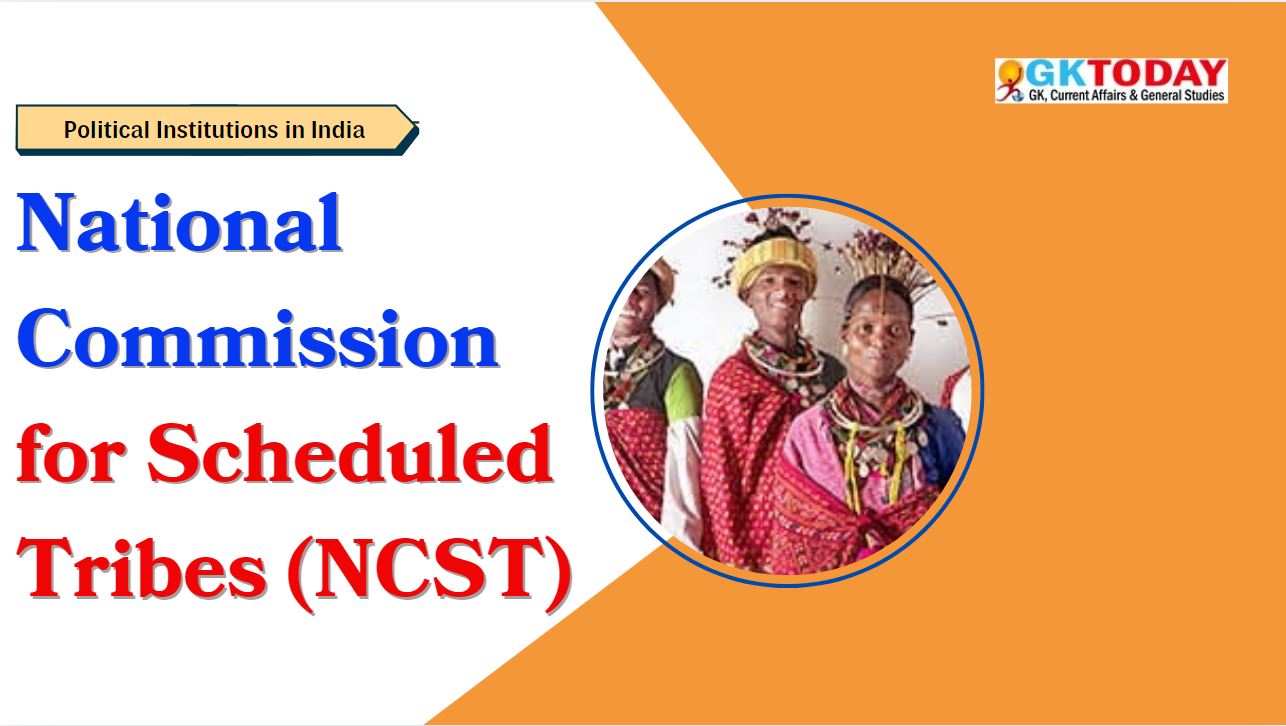National Commission for Scheduled Tribes (NCST) [UGC NTA NET Political Science Notes]
The National Commission for Scheduled Tribes (NCST) is a constitutional body in India dedicated to the protection and promotion of the rights and interests of Scheduled Tribes (STs). Established on 19th February 2004, the NCST operates under Article 338A of the Constitution of India. Its mission is to ensure that the unique challenges faced by STs are addressed effectively through legal and policy frameworks.
Establishment
The NCST was formed as step towards recognising the rights of Scheduled Tribes in India.
- Constitutional Backing – Established under Article 338A of the Constitution.
- Purpose – To protect the interests of STs and promote their welfare.
- Historical Context – The formation is part of India’s broader commitment to social justice.
Composition
The NCST consists of five members, ensuring diverse representation.
- Chairperson – Appointed by the President of India.
- Members:
- Two members from the Scheduled Tribes.
- One member from the Scheduled Castes.
- One member from other communities.
- One member with expertise in education, health, or social work.
This varied composition enhances the Commission’s ability to address a wide range of issues affecting STs.
Tenure
Members of the NCST serve a term of three years, with the possibility of reappointment.
- Continuity – This structure allows for consistent focus on ST issues.
- Experience – Reappointments enable the retention of valuable expertise.
Functions and Powers
The NCST has several key functions aimed at protecting the rights of STs.
Investigative Powers
- Complaint Inquiry – It can investigate specific complaints regarding violations of ST rights.
- Safeguards Review – Investigates matters related to constitutional safeguards for STs.
Advisory Role
- Policy Advice – Advises the government on policies and programmes for ST welfare.
- Recommendations – Suggests measures for effective implementation of laws.
Monitoring
- Scheme Oversight – Monitors the implementation of welfare schemes for STs.
- Beneficiary Reach – Ensures schemes effectively reach intended beneficiaries.
Reporting
- Annual Reports – Prepares and presents reports to the President of India.
- Recommendations – Reports include suggestions for ST welfare and areas needing attention.
Jurisdiction
The NCST covers all Scheduled Tribes across India.
- Coordination – Works with state governments and statutory bodies.
- Multi-Level Governance – Ensures ST interests are addressed at various levels.
Significance
The NCST plays a vital role in promoting social justice for Scheduled Tribes.
Representation
- Governance Inclusion – Ensures ST representation in governance.
- Addressing Challenges – Inclusion is crucial for tackling unique community challenges.
Economic Development
- Livelihood Opportunities – Aims to create sustainable economic opportunities for STs.
- Skill Development – Focuses on enhancing skills for better employment prospects.
Cultural Preservation
- Heritage Protection – Works to preserve the cultural heritage of STs.
- Identity Maintenance – Cultural preservation is essential for community identity.
Related Constitutional Provisions
The NCST’s functions are supported by various constitutional provisions.
- Article 46 – Promotes the educational and economic interests of STs.
Challenges
Despite its role, the NCST faces several challenges.
Limited Powers
- Enforcement Issues – Limited powers compared to other commissions can hinder enforcement.
- Recommendation Compliance – Government may not fully comply with recommendations.
Implementation Issues
- Resource Constraints – Government agencies often lack necessary resources.
- Commitment Gaps – There may be a lack of commitment to implement recommendations.
Awareness and Outreach
- Community Awareness – Greater awareness among ST communities about NCST is needed.
- Outreach Efforts – Essential to inform STs of their rights and available support.
Recent Developments
The NCST continuously updates its findings on the status of STs in India.
Stakeholder Engagement
- Policy Formulation – Engages with various stakeholders for effective policy formulation.
- Collaborative Discussions – Involves discussions with government bodies, NGOs, and community leaders.
Reports and Recommendations
- Key Issues – Recent reports highlight critical issues affecting STs.
- Focus Areas – Recommendations aim to improve access to education, healthcare, and employment.


